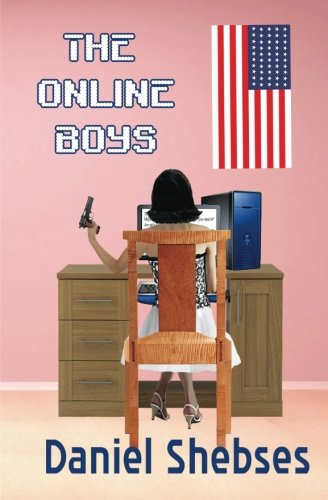I am delighted to present my talented friend who shares my dark, sadistic sense of humor, as his debut novel The Online Boys is released. Having read the early drafts of the novel and witnessed the submission process, I am so happy to see it in print.
In a toxic world of peer pressure, torment, and rivalry, justice is just one click away for these three high-school underdogs. Thousands of miles apart from each other, each trapped in his own circle of hell, they find solace in a mysterious online ally named Nikki who strokes their fragile egos and urges them to realize their ultimate revenge fantasies. How far will the three outcasts go to impress the best friend they never met? Set in the grotesque and volatile e-universe, where nothing is what it seems, The Online Boys is a disturbing and psychologically authentic cyber-thriller for both bullies and victims.
MJN: We live in a world where it's becoming increasingly hard to shock anyone. Topics like rape to terrorism become matters for campy summer thrillers. I just had that conversation, as matter of fact, with another author, whose book about terrorism was labeled as a "beach read". School violence, namely those incidents involving firearms, is one of the few topics that still makes people cringe. And it's one subject that many publishers won't touch. I'm pleased that Black Opal accepted your manuscript.
DS: I was overjoyed when Black Opal offered me the contract.
I began writing seriously in November, 2005 and my first book remains
unpublished. "The Online Boys" was my second attempt. I certainly
don't condone school or gun violence, but I believe one reason this subject
matter makes people cringe is because we live in a child worship culture where
too many parents believe that their children are little angels who can do no
wrong. In reality, children are just little versions of adults with the same
flaws and attitudes. It is completely ridiculous to think of children as
"innocent." The other (and more obvious) reason this is difficult
subject matter for some is because people love their children, and this book
plays on their worst fears of something horrible happening to them.
MJN: Are there any particular scenes you struggle writing?
I'm asking because I cannot write an earnest sex scene with a straight face. I
start cracking up. It seems so awkward and silly to me. For that reason I try
to move all my sex scenes behind closed doors, much to the disappointment of
your readers. Is there any particular scene that's a struggle to you? Your
bullying scenes were excellent, by the way. Very realistic and raw.
DS: First off, thank you, I wanted the bullying scenes to be
realistic and raw. As for a difficult scenes to write, I have to wonder how
writing sex scenes would be for me. Truth be told, I have never written one.
Sometimes violent scenes can be difficult, especially if you are trying to
describe the action second by second. I didn't really have that issue for
"The Online Boys" but in my first unpublished book there was a scene
of two men fighting in a bathroom. I agonized for weeks on that scene and to
this day, I'm not sure I've gotten it right.
MJN: Let's dream big for a minute. If your book was adapted
as a screenplay, which director would you pick? I imagine Tarantino handling
the material.
DS: Tarantino would be fine, but I don't really have a
preference. If "The Online Boys" was actually picked to become a
film, that shock alone would floor me. That being said I have to say that
Martin Scorsese did a wonderful job with "The Departed." That movie
had raw and realistic violence.
MJN: I'm sure you are aware of this, but no human being is a bully or a victim 100% of the time. In fact, some of the worst bullies are former victims. Everyone, including the celebrities, has a weepy story about how they were an ugly duckling in middle school. It takes a strong and honest person to stand up and say, "You know, maybe I did my share of bullying." Would you agree with that?
DS: I would completely agree with that. Even if you did not
seek out a victim and bully him/her relentlessly, chances are there have been
people in your life who you have been insulting to or could have treated
better. All too often people have selective memories, meaning they remember their
victimization while forgetting the times they were the aggressor. It sometimes
seems that people cherish their past victim-hood and seek to capitalize on it
in some way, while at the same time distance themselves from episodes that show
them in a more negative light.
MJN: The focal characters in your novel are male. Maybe your
next novel will be Online Chicks?
DS: I'll leave the female version of this book to a female
writer who has more of an idea of how the female mind works.

No comments:
Post a Comment